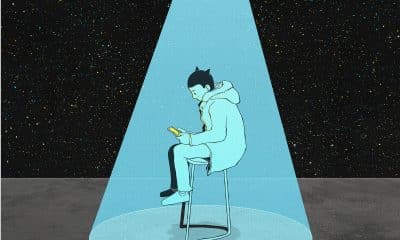Tech Plunge
Online dating was once considered a “big taboo”: Able Joseph, CEO of dating app Aisle
Not too long ago, online dating in India was considered to be a big taboo due to cultural restrictions and lack of trust on dating apps, says Able Joseph, Founder and CEO of dating app Aisle. People preferred looking for a partner in their limited vicinity and were averse to the idea of finding love online.
But now, all that has changed. Joseph believes the advent of matrimonial apps changed the status quo. “People started finding potential marriage prospects online. However, the autonomy on these apps to find a partner still belonged to families and extended family.”
Here in an interaction with Able Joseph, Founder and CEO of dating app Aisle, we discuss India’s acceptance of online dating:
How did the dating app Aisle come about? What was the inspiration?
Aisle, which was founded in 2014, is currently the second most downloaded dating app in India. It was developed as a wise middle path between matrimony sites and casual dating apps for people who were looking for serious relationships. People who were looking for arranged marriages online were not happy with the profiles on the platform as they were managed by parents and not the person themselves. On the other hand, dating apps were helping users find love online but the user intent on most of these casual apps remained unestablished. We saw an opportunity there to create a high intent dating platform and founded Aisle as a singles’ community. The idea was to help users connect with their potential partners directly and create an alternative to the existing matrimonial sites and casual dating apps.
Has it grown in terms of the number of members and outreach?
Aisle has grown exponentially over the past 6 years and we have crossed 5 million users in the beginning of 2021. In the last year alone, we added 2 million users. Apart from Tier 1 cities we are also seeing an increase in our Tier 2 & Tier 3 cities userbase.
Since India is a diverse country with different cultures and religions, what was the impact of Aisle? Was it taken seriously? Has the company received any negativity or backlash from any group?
Unlike western dating apps, Aisle is built according to the Indian sentiments/sensitivities and provides its users a platform for meaningful relationships. It is designed taking into account the culture, subculture and counterculture. On Aisle, the profiles will not just have a photo and a name but also details that potential partners would like to know including one’s faith, mother tongue, community etc. Due to its high intent, Aisle has more success stories per 1000 users than any other dating app in India and we’d say that’s a good measure that speaks for itself.
How’s the competition with other dating apps, particularly Tinder as its internationally renowned?
We are a dating app which is made by Indians and for Indians. Aisle is exactly designed keeping in mind Indian preferences and works as a relationship centric platform that connects people looking for love. We were the 2nd most downloaded dating app in 2020 and were ranked 3rd amongst the top grossing dating apps after the billion dollar companies like Tinder and Bumble. Tinder’s entry into India happened when the general dating sentiment was conservative. The company however did enjoy first mover advantage. A lot of young people wanted to experience dating and hopped on to the wagon. Tinder did not change its strategies according to the Indian youth and continued to replicate its western strategies. Today people are moving beyond the western apps and the casual fling culture and inclining towards high intent matchmaking.
What is the potential market scope for dating apps in India?
Online dating in India was considered to be a big taboo due to cultural restrictions and lack of trust on dating apps. People preferred looking for a partner in their limited vicinity and were averse to the idea of finding love online. The advent of matrimonial apps changed the status quo. People started finding potential marriage prospects online. However, the autonomy on these apps to find a partner still belonged to families and extended family.
Also Read: Smartphone market hit by drop in consumer demand amid COVID-19 pandemic
With a population exceeding 1.3 billion, of which nearly 20 percent is in the prime age demographic for dating, India was a prize most western dating apps had eyes on. The entry of apps like Tinder set the ball rolling. There was a time when the Indian dating market was flooded with western dating apps, but these apps didn’t cater to the Indian population in entirety. The ‘casual fling’ culture and the ‘hookup’ culture promoted by these apps didn’t work and this led to a decline in their popularity and user base. We realised the need to build an app that catered to the Indian market and understood the population in all its sensitivities. So, we built a platform that was not too casual and also didn’t pressurise users to initiate conversations around marriage like matrimony websites.
As of today, the potential market scope of dating in India is huge. The need is to create customised solutions based on geography, preference, culture etc. and solve for long term matchmaking. The value proposition of casual swiping has gone and meaningful matchmaking is on the rise.
How did the app take the COVID driven nationwide lockdown in 2020? Did it have an impact?
Initially when the lockdown hit we saw a surge in the number of installs due to boredom. We saw that people were on the app for a longer time and had longer conversations with their matches than before the pandemic. During the second half of 2020, boredom turned to loneliness and people felt the need to have a permanent romantic partner and that’s where Aisle helped. Meeting people online also became the new normal as it was the only option people had at that time. Apart from this, we saw a surge in the installs, especially in Tier 2 & Tier 3 cities. We also launched “Rooms”, an audio feature on the app as a way to make dating more personal as meeting in person was unfavourable during that time.
As a start-up company, what is your outlook? Plans for expansion
As a high intent dating app, our mission at Aisle is to build a platform that connects people looking for meaningful relationships. Earlier this year we raised pre -series A funding led by founders of Hurun India and Konglo Ventures and started working on our strategy to launch vernacular apps in Tier 2 & 3 cities. We launched Arike, a dating app designed for Malayalis. We’ve also almost doubled in team size for us to be able to execute our expansion plans and if the strategy works we would consider expanding into other Tier 2&3 cities too.











































Pingback: Avon’s new skincare discovery, Protinol is clinically proven to restore both types of collagen found in healthy skin, helping to mimic the perfect collagen.